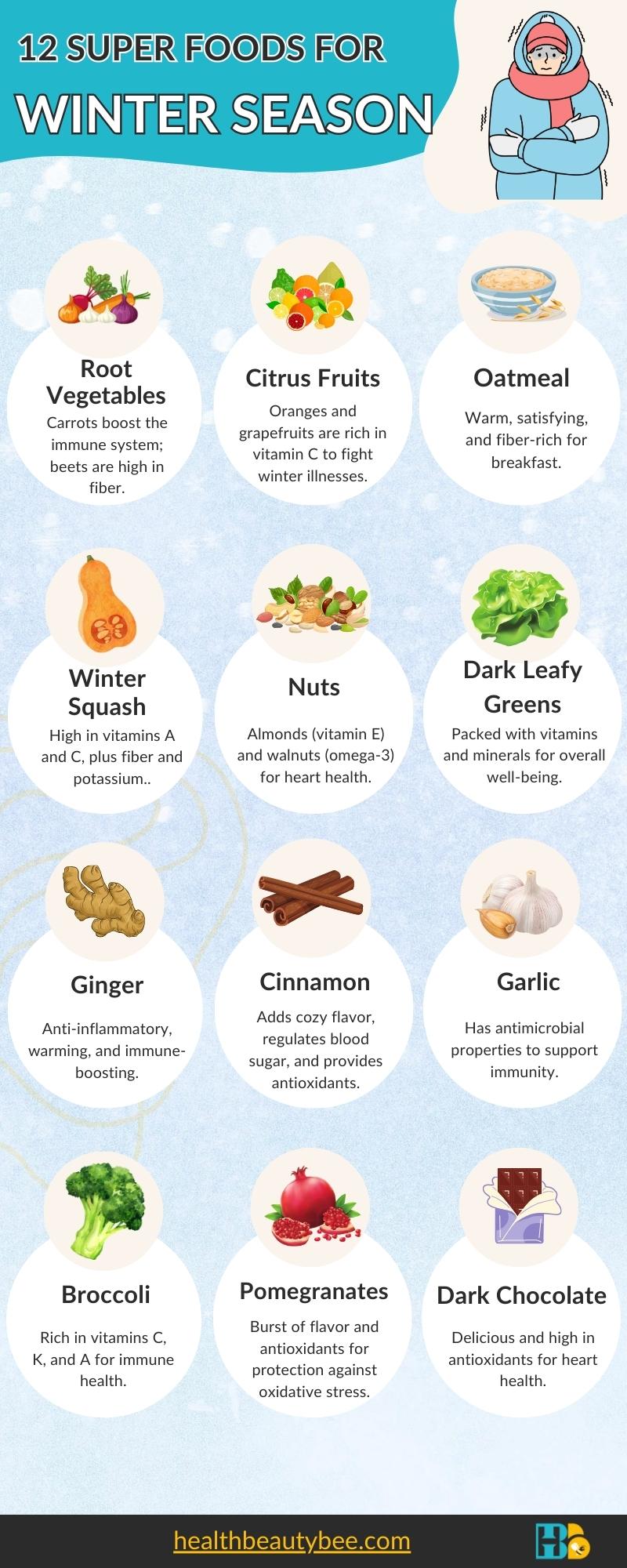During the winter season, our bodies often crave warm and comforting foods that provide the necessary nutrients to keep us healthy and cozy. Luckily, nature provides us with an abundance of superfoods that are not only delicious but also packed with essential vitamins and minerals to support our well-being.
In this article, we will explore 12 home remedies in the form of superfoods that will keep you warm and nourished throughout the chilly winter months.
12 Super Foods for Winter Season to Keep You Warm
1. Root vegetables
Winter vegetables are a crucial part of any balanced diet during this time of year. By incorporating winter vegetables into your meals, you’re not only keeping warm but also ensuring your body receives the necessary nutrients to thrive during the winter season. These winter vegetables can include various options such as hearty root vegetables like carrots and beets.
Carrots are packed with vitamins A and C, which can help boost your immune system during the winter months.
Beets, on the other hand, are high in fiber which supports muscle function and overall heart health.
2. Citrus fruits
Winter fruits are not only delicious but also a treasure trove of vitamins and antioxidants that can help strengthen your immune system. Citrus fruits, such as oranges and grapefruits, are at their peak during the winter season. They’re loaded with vitamin C, which is essential for boosting your immune system and fighting off winter illnesses.
Incorporating these winter fruits into your diet will provide various beneficial nutrients to help you stay healthy and warm.
3. Oatmeal
Oatmeal is the ultimate comfort food during the winter season. Not only is it warm and satisfying, but it also offers numerous health benefits. Oats are rich in fiber, which aids in digestion and helps you feel fuller for longer, making it an excellent breakfast choice.
By starting your day with a warm bowl of oatmeal topped with seasonal fruits, you’re not only nourishing your body but also indulging your taste buds in a satisfying and comforting way.
4. Winter squash
Winter squash is another superfood that deserves a place on your winter menu. Varieties such as butternut squash and acorn squash offer a rich and sweet flavor, making them perfect for comforting winter dishes. Winter squash is rich in vitamins A and C, which are essential for immune function and maintaining healthy skin.
Additionally, they are a great source of fiber and contain important minerals. Whether roasted, mashed, or added to soups and stews, incorporating winter squash into your meals will provide warmth, flavor, and a wide range of nutrients.
5. Nuts
Nuts, such as almonds and walnuts, are not only delicious and satisfying but also offer a variety of health benefits. These winter superfoods are packed with essential nutrients, including healthy fats, fiber, and a range of vitamins and minerals.
Almonds are rich in vitamin E, which supports healthy skin and immune function, while walnuts contain omega-3 fatty acids that promote heart health and help reduce inflammation. Enjoy these nuts as a convenient and nutritious snack during the winter season or incorporate them into your meals to add a crunchy texture and an extra nutritional boost.
6. Dark leafy greens
Dark leafy greens are a vital part of any winter diet. Vegetables such as spinach and kale are packed with nutrients that support overall well-being. These winter vegetables are rich in vitamins A, C, and K, as well as iron, calcium, and folate.
Including more dark leafy greens in your diet can help strengthen your immune system, improve digestion, and support bone health. Whether they’re added to salads, soups these nutrient-dense vegetables offer a vibrant and healthful addition to your winter meals.
7. Ginger
Ginger, known for its aromatic and warming properties, is often used in winter remedies to combat cold symptoms and soothe the body. This winter superfood has powerful anti-inflammatory and antioxidant properties, which can help boost your immune system and reduce inflammation in the body.
8. Cinnamon
Cinnamon is a popular spice that not only adds a warming and cozy flavor to dishes but also provides various health benefits. This winter superfood has anti-inflammatory and antioxidant properties and can help regulate blood sugar levels. Adding cinnamon to your oatmeal, hot beverages, or even baked goods can infuse your winter diet with a delicious and comforting aroma while contributing to your overall well-being.
9. Garlic
Garlic is not only a staple ingredient in many savory dishes but also a powerful winter superfood. It contains compounds that have antimicrobial and immune-boosting properties, making it an excellent addition to your diet during the winter months.
Incorporating garlic in soups, stews, and roasted vegetable dishes can not only enhance the flavors but also provide you with its potential health benefits to keep you warm and well.
10. Broccoli
Broccoli, a cruciferous vegetable, is a nutritional powerhouse that offers numerous health benefits. This winter superfood is packed with vitamins C, K, and A. Consuming broccoli during the winter season can help support your immune system and promote healthy digestion.
Whether steamed, roasted, or added to stir-fries and salads, broccoli is a versatile and nutritious addition to your winter meals.
11. Pomegranates
Pomegranates are a delightful winter fruit that not only adds a burst of color and flavor to your dishes but also provides a range of health benefits. These winter fruits are loaded with antioxidants, which help protect your body against oxidative stress and inflammation.
12. Dark Chocolate
Dark chocolate is a delicious indulgence during the winter season and also offers health benefits. High in antioxidants, dark chocolate helps reduce inflammation, improve heart health and reduce stress levels.
Additional Tips for a Healthy Winter Season
1. Stay Hydrated
While it may be tempting to indulge in warm beverages like hot chocolate and coffee during the winter, don’t forget to stay hydrated. Drinking an adequate amount of water helps keep your body functioning optimally, regulates body temperature, and supports immune function. Herbal teas and warm water with lemon can be great alternatives to keep you warm and hydrated throughout the day.
2. Prioritize Sleep
The colder months provide the perfect opportunity to prioritize sleep and allow your body to rest and repair. Aim for 7-9 hours of quality sleep each night to boost your immune system, improve concentration, and enhance mood. Create a relaxing bedtime routine, keep your bedroom cool, and limit exposure to electronic devices before bed to improve sleep quality.
3. Maintain a Balanced Diet
A balanced diet plays a crucial role in supporting overall health, especially during the winter season. Incorporate a variety of fruits and vegetables to ensure you’re getting essential vitamins. Focus on warm, nourishing meals like soups, stews, and roasted vegetables. Opt for whole grains and lean proteins to provide sustained energy and support your immune system.
4. Stay Active Indoors
Staying active during the winter season is vital for both physical and mental well-being. Engaging in indoor activities like yoga, pilates, or home workouts can keep you active even when it’s cold outside. Exercise helps boost mood, improve circulation, and strengthen your immune system. Consider following online workout classes or investing in home exercise equipment to stay motivated.
5. Practice Good Hygiene
Practicing good hygiene is essential for preventing the spread of winter illnesses. Remember to wash your hands frequently with soap and water for at least 20 seconds. Avoid touching your face, especially your eyes, nose, and mouth. Cover your mouth and nose with a tissue or your elbow when coughing or sneezing to prevent the spread of germs.
6. Dress Appropriately for the Weather
Protect yourself from the cold temperatures by dressing warmly and in layers. Wear fabrics that provide insulation, such as wool or fleece, and don’t forget to cover your head, hands, and feet to prevent heat loss.
7. Boost Your Mood with Mindfulness
Winter can sometimes bring a dip in mood and energy levels. Combat this by incorporating mindfulness practices into your daily routine. Practice deep breathing exercises, meditation, or yoga to reduce stress and boost your mood. Surround yourself with uplifting scents, listen to calming music, or indulge in activities that bring you joy and relaxation.
Infographic: 12 Super Foods for Winter Season to Keep You Warm
Save this infographic in high-quality PDF format
 Conclusion:
Conclusion:
As the cold winter months settle in, it’s essential to nourish ourselves with foods that provide warmth, comfort, and essential nutrients. Incorporating these 12 superfoods into your winter diet, including a variety of winter vegetables, fruits, spices, and nuts, will not only keep you warm but also support your immune system and overall health.











